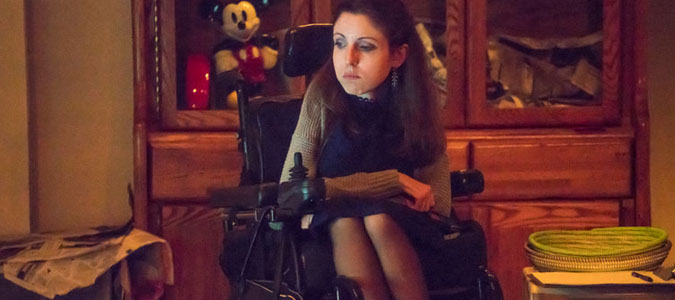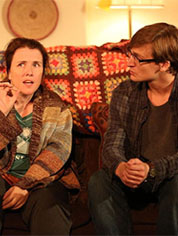

The Healing
Opening Night: June 22, 2016
Closing: July 16, 2016
Theater: Clurman Theatre
Twenty-five years ago, a motley group of friends met as kids at a summer camp where the head counselor secretly taught them that their disabilities could be “cured” through the power of prayer. Today, the group has gathered to mourn the untimely passing of one of its members. Over the course of the night, old wounds are uncovered, friendships are tested and the truth surrounding their late friend becomes troublingly clear.
BUY TICKETSREAD THE REVIEWS:
June 22, 2016
“Do you think we could have — done something?” The words hang awkwardly in the air in “The Healing,” a moving, beautifully acted new drama, by Samuel D. Hunter, about friends gathering to mourn a woman who took her own life. Presented by Theater Breaking Through Barriers, a company dedicated to promoting the work of artists with disabilities, the show, which opened on Wednesday at the Clurman Theater, features a cast of mostly disabled actors. Set in a small town in Idaho — the regular stamping grounds of Mr. Hunter, author of “The Whale” and “The Few” — the play, directed sensitively by Stella Powell-Jones, unfolds in the clean but tchotchke-cluttered living room of the deceased woman, Zoe, an obsessive TV shopper. It’s the evening after the funeral, and some of Zoe’s old friends have gathered to sort through her things (she left no close family), and to sort through their sorrow. As children with disabilities of different kinds, they all went to the same Christian Science summer camp, where they were taught by its leader, Joan (Lynne Lipton), to believe, as Sharon (Shannon DeVido), the most sharp-tongued among them, puts it, “that there was something spiritually wrong with us.” Sharon, who was perhaps closest to Zoe, disavowed her childhood faith when she was 13, and along with some of the others, eventually campaigned successfully to have the camp shut down. But Zoe (an affectingly sincere Pamela Sabaugh) remained a believing Christian Scientist. In one of the seamlessly integrated scenes set in the past, Zoe, nagged by a case of strep throat, tries to persuade Sharon to pray with her. “You have a gift,” she says. “God gave you a gift of healing.” She reminds a frustrated Sharon of an incident in their childhood, when Zoe believes that Sharon’s prayer helped heal her after a fall. Sharon, played by Ms. DeVido with a veneer of sardonic toughness covering an innate sensitivity, pushes back. “I didn’t heal you when we were kids, and I can’t heal you now,” she snaps. (But she did, we learn, by secretly slipping antibiotics into Zoe’s food while she was visiting.) Mr. Hunter writes with lively humor and grace, depicting the awkwardness and grief that hover in the air among Zoe’s friends. These include Donald (played with gentle warmth by David Harrell), who’s closest to Sharon and tries to comfort her, despite his own feelings of guilt. Bonnie (a forceful Jamie Petrone) arrives in a flurry of apology, having been unable to get to Idaho in time for the funeral, along with her boyfriend, Greg (John McGinty, nicely playing the genial outsider in the group). Bonnie, in fact, hadn’t been told that Zoe committed suicide, and is angry and dismayed when she learns the truth. She gets the unpleasant news from Laura (Mary Theresa Archbold), a blunt-spoken associate professor of Baltic studies at the University of Montana. Ms. Archbold nails her bone-dry humor: During an awkward conversation with Greg, who’s deaf, Laura says, “I shouldn’t take Vicodin and interact with people.” Ms. Archbold also delivers a particularly fine monologue, about returning to see the institution in Latvia where she spent her early years before being adopted. All of the characters with disabilities are drawn with layered naturalness; you quickly forget that they face challenges most people do not as their exchanges focus on issues that affect everyone: jobs, relationships (or lack thereof), feelings of moral inferiority and anxiety, the solace of religious faith (or the lack thereof) and plain old garden-variety sadness, the kind that some can move through and others, like Zoe, cannot. Although its temperature remains fairly sedate, “The Healing” rises to a quiet emotional climax with the unexpected arrival of Joan herself. Ms. Lipton is wonderful at expressing Joan’s abashed air of apology as she timidly enters the room. Her soft, high voice seems to contain a plea for sympathy — or at least tolerance — from what she assumes will be a hostile reception, particularly from Sharon, who was angry at Donald for even inviting her to the service. But Mr. Hunter surprises us in the touching final scene between these two former adversaries. Both were friends of Zoe’s, and while Sharon cannot help accusing Joan of being partly responsible for her death, the conversation doesn’t stop there. “The Healing” leaves us with a comforting intimation that, just as tragedy can strike us out of the blue, healing can come just as unexpectedly, and from unlikely sources, too.
READ THE REVIEW


















